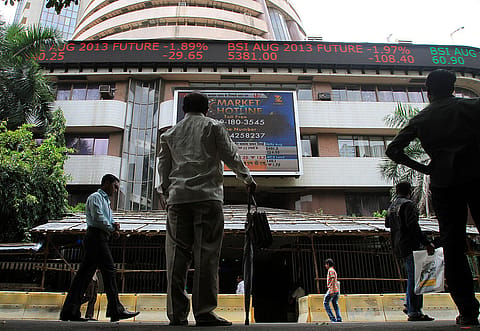Markets rebound nearly 2% as Trump pauses tariff hike on dozens of countries
BSE Sensex ended the day by closing 1310.11 points up, while Nifty ended the session at 22,828.55, up 429.40 points

Capital markets wrapped up the volatile week on a "strong" note, gaining nearly 2% today, buoyed by positive global cues, especially an unexpected pause on the proposed reciprocal tariffs by the US on most countries, excluding China. TCS' Q4 FY25 results missed the Street estimates, and the effect was seen in its share today, though the damage was not significant as the CEO said better days are expected in the coming months.
BSE Sensex ended the day by closing 1.77% or 1310.11 points up at 75,157.26, while Nifty closed 1.92% or 429.40 points up at 22,828.55. This helped the benchmark indices recover some losses incurred in the past week since US President Donald Trump imposed heavy duties on around 100 countries. With this, while BSE Sensex remains 0.66% down at 75,157.26 in the last one week, Nifty remains 1.07% in the red.
The U.S. decision to defer tariffs for all countries, except China, eased recession concerns, boosting sentiment and lifting fears of a global slowdown.
Among the companies on the BSE indices, Tata Steel, Power Grid and NTPC topped the chart in terms of upward momentum, while TCS closed 0.20% down at Rs 3,239.60. All BSE indices, including BSE Bankex and BSE Midcap and BSE 100, closed positively on better market sentiments.
During the early morning trade, the Nifty index opened with a strong gap-up and tested resistance near the 20-day exponential moving average (DEMA) around 22,900. It then moved in a narrow range before settling at 22,828.55. Sector-wise, metals, energy, and pharma led the gains, while broader indices also saw a solid rebound, rising between 1.82% and 2.86%.
Market analysts say the recovery, supported by a continued decline in the volatility index, is a positive sign, though such sharp moves remain challenging to trade. They believe on the index front, a decisive close above 22,900 could pave the way for a retest of the key moving average zone near 23,400. As a downside, immediate support lies at 22,300. Until more stability is seen, analysts recommend maintaining a hedged approach by staying focused on global developments and corporate earnings for further direction.
Rupak De, Senior Technical Analyst at LKP Securities, says: "The Nifty faced resistance around the 21-EMA on the daily timeframe, leading to a close off the day’s high. The trend appears bearish unless it decisively moves above 23,000, where significant open interest has been added. On the downside, support is placed at 22,750; a break below this level could intensify the bearish sentiment. Conversely, a decisive move above 23,000 may trigger a rally towards 23,500, as suggested by the positive divergence in the RSI."
Notably, Trump has announced around 10%-46% duties on the imports of 90-100 countries, including a reciprocal tariff of 26% on Indian exports, though relatively lower than most countries. China faces the harshest duties at 145%, while the neighbouring country has also retaliated by raising duties on American goods to 125% from 84% before, escalating the tensions between the two economic superpowers of the world.
On April 9, the day when Trump’s tariff hike across trading partners worldwide was expected to kick in, he pressed a pause button. The proposed increase in tariffs on all products – a 26% tariff on most goods exports to the U.S. in India’s case – from these countries will not be applicable for 90 days now, he said. Trump’s rationale for a temporary pause on the punitive measures announced by him early this month is that majority of these countries – more than 75 of them – have initiated talks with ‘Representatives of the United States to negotiate a solution to the subjects being discussed relative to trade, trade barriers, tariffs, currency manipulation, and non-monetary tariffs’.